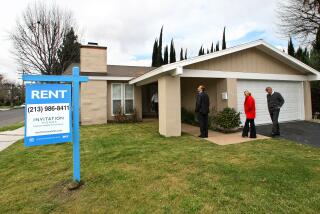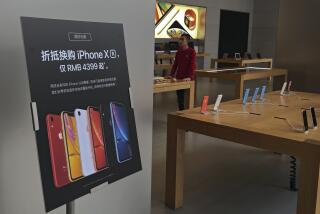Settlement Announced in Phone Lawsuit
- Share via
AT&T; Corp., Lucent Technologies Inc. and other phone makers have agreed to pay up to $300 million to settle a class-action lawsuit accusing them of collecting exorbitant monthly rental fees for outdated or unused phones.
The settlement, announced late Friday, was accepted by a Circuit Court judge in Illinois, where the case was set to go to trial this week.
It’s unclear how many telephone customers will share in the settlement, but a Lucent spokesman said up to 30 million customers could qualify for part of the settlement. Attorneys will place advertisements in general newspapers to notify potential recipients.
The case, filed in 1996, takes aim at the controversial practice by phone companies of continuing to collect rental fees for rotary phones and other old models that most customers long ago replaced with cheaper, more advanced models. Many consumers have continued to pay the phone rental fees, which ran $4.25 a month for a basic phone, not realizing that new phones cost as little as $15 at electronics stores.
Lucent said it would take its part of the settlement, $162 million, as a charge against its fiscal third-quarter results to be announced next week, Bloomberg News reported. AT&T;, the largest U.S. long-distance phone company, said it is paying $130 million before taxes in the settlement.
The settlement also includes prepaid calling cards, which are being donated to charities, Lucent said.
After the 1984 breakup of AT&T; into smaller local telephone companies, customers could choose to keep leased phones or buy new ones. The lawsuit accused the companies of misleading actions over the leases and charges for them, Lucent said.
Avaya Inc. and NCR Corp., former units of Lucent and AT&T;, also will pay part of the settlement, which must be approved by the court.
New York-based AT&T;, the largest U.S. long-distance company, spun off Lucent, its phone equipment arm, in 1996.
All companies involved said they did not admit liability in the settlement.
NCR spokesman John Hourigan said his company would be liable for about 3% of the settlement, according to terms of NCR’s 1996 spinoff from AT&T.; He couldn’t provide the exact amount that Dayton, Ohio-based NCR would pay.
Lynn Newman, a spokeswoman for Avaya, said that the company had not yet figured out its share of the agreement and that it would not be final until the suit’s claims and attorneys’ fees are resolved. Basking Ridge, N.J.-based Avaya is the office telephone unit spun off from Lucent in 2000.
The settlement agreement was disclosed after the markets closed. On the New York Stock Exchange, Lucent fell 2 cents to $1.49, AT&T; rose 20 cents to $10, Avaya climbed 10 cents to $1.40, and NCR was unchanged at $27.






